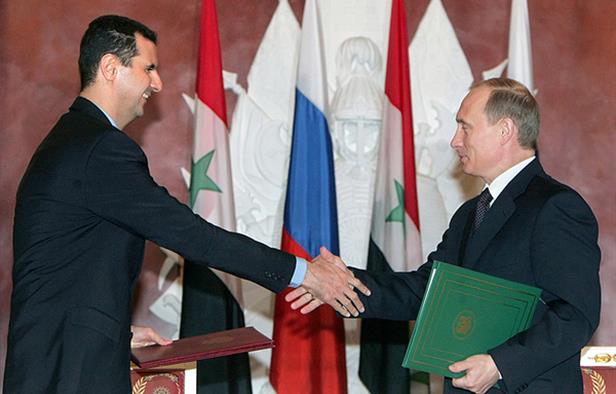Russia, Iran and Syrian legitimacy
Khairallah Khairallah/The Arab Weekly/August 28/16
Amid furore over Russia’s use of airbase in Iran’s western Hamadan province, it is clear that there can be no outright victory.
Despite Russian air strikes from Iran’s Hamadan Airbase and Iran-backed militias fighting on the ground, a Russian-Iranian victory in Syria remains elusive. Amid the furore over Russia’s use of the airbase in Iran’s western Hamadan province close to the Iraqi border and whether this will continue, it is clear that there can be no outright victory regardless and continuing on the same path will change nothing.
Tehran and Moscow are relying on a Syrian regime that has no legitimacy, that has been rejected by its own people and the wider international community and whose days are numbered. In short, Russia and Moscow are in an impossible position thanks to their support of Syrian President Bashar Assad and his teetering regime. They had propped up this regime to protect their interests in Syria but these interests are under more threat than ever.
Most importantly, Iran and Russia’s strategic interests in Syria are not mutually inclusive. Russia wants to protect its military and economic interests in the region through Syria, while confirming that it remains a major player on the international stage.
As for Tehran, Syria is a vital conduit to Lebanon and the Iran-backed Hezbollah militia, which has been working to promote and secure Iranian interests across the region and beyond. Hezbollah’s role cannot be underestimated; the militia has even played a part in supporting Houthi rebels fighting in Yemen. Hezbollah’s growing political role in Lebanon means that that country is under de facto control of Iran.
So Russia and Iran are looking for legitimacy from a regime that has none, even if they are looking for different kinds of legitimacy. Russia is depending on its history of relations with the Syrian military and security institutes, while Iran is banking on sectarian interests prevailing, namely its relationship with Syria’s Alawite-led regime, if not necessarily the entire Alawite community.
Syria’s Alawite community at large, which numbers up to 4 million, views Damascus’s relationship with Tehran with caution and is worried about the possible establishment of an Alawite statelet in the coastal region and what that would mean for its future.
Ultimately, Russia and Iran will fail in their endeavours to prop up the Assad regime. The military regime that Moscow is banking on ended a long time ago. For Tehran to succeed based on sectarian ties, it would require major demographic and territorial changes in Syria that are simply not possible, even with the campaign of forced displacement that we have been seeing in Homs or Aleppo. About three-quarters of the Syrian people are Sunnis; nothing can be done about that. They will reject any agreement or deal that would see them transformed into second-class citizens.
Historically, the Assad regime has depended on its security and military power effectively silencing its detractors. It has also relied on an alliance of Syria’s minorities, led by the Alawites, who, in turn, have taken the leading role in the security and military apparatus. This had been an effective policy until the recent conflict but it is now a thing of the past. Russia and Iran would be unwise to rely on old formulas such as this.
Russia and Iran, whether working together or separately, cannot and will not succeed in Syria. But the threat is in the partition of Syria and whether this could serve Russian and Iranian strategic interests. If that proves the case, there can be no doubt where things are headed.
**Khairallah Khairallah is a Lebanese writer. The commentary was translated and adapted from the Arabic. It was initially published in middle-east-online.com.






















